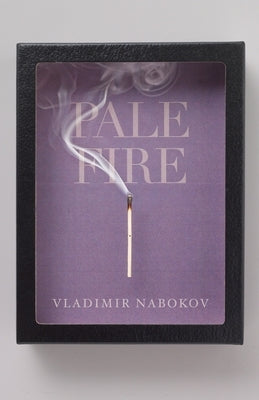Description
A darkly comic novel of suspense, literary idolatry and one-upmanship, and political intrigue from one of the leading writers of the twentieth century, the acclaimed author of Lolita. "Half-poem, half-prose...a creation of perfect beauty, symmetry, strangeness, originality and moral truth. One of the great works of art of this century." --Mary McCarthy, New York Times bestselling author of The Group An ingeniously constructed parody of detective fiction and learned commentary, Pale Fire offers a cornucopia of deceptive pleasures, at the center of which is a 999-line poem written by the literary genius John Shade just before his death. Surrounding the poem is a foreword and commentary by the demented scholar Charles Kinbote, who interweaves adoring literary analysis with the fantastical tale of an assassin from the land of Zembla in pursuit of a deposed king. Brilliantly constructed and wildly inventive, Vladimir Nabokov's witty novel achieves that rarest of things in literature--perfect tragicomic balance.
Author: Vladimir Nabokov
Publisher: Vintage
Published: 04/23/1989
Pages: 320
Binding Type: Paperback
Weight: 0.53lbs
Size: 8.05h x 5.31w x 0.70d
ISBN13: 9780679723424
ISBN10: 0679723420
BISAC Categories:
- Fiction | Classics
- Fiction | Literary
- Fiction | Absurdist
Author: Vladimir Nabokov
Publisher: Vintage
Published: 04/23/1989
Pages: 320
Binding Type: Paperback
Weight: 0.53lbs
Size: 8.05h x 5.31w x 0.70d
ISBN13: 9780679723424
ISBN10: 0679723420
BISAC Categories:
- Fiction | Classics
- Fiction | Literary
- Fiction | Absurdist
About the Author
VLADIMIR VLADIMIROVICH NABOKOV was born on April 23, 1899, in St. Petersburg, Russia. The Nabokovs were known for their high culture and commitment to public service, and the elder Nabokov was an outspoken opponent of antisemitism and one of the leaders of the opposition party, the Kadets. In 1919, following the Bolshevik revolution, he took his family into exile. Four years later he was shot and killed at a political rally in Berlin while trying to shield the speaker from right-wing assassins.

